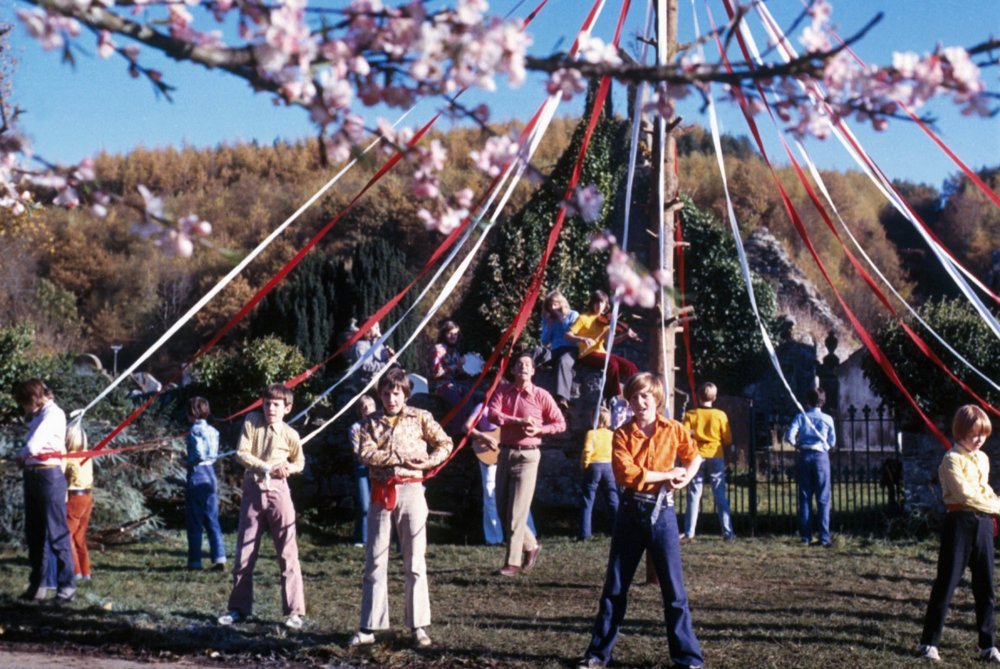[Film Review] The Wicker Man (1973)

The Wicker Man (1973) from director Robin Hardy tells the tale of Sergeant Neil Howie, who is sent to the remote Scottish island of Summerisle to investigate the disappearance of a missing girl, Rowan Morrison. When he arrives he finds the residents are hostile, and unwilling to help his investigation. Drawn deeper into the traditions of the island, as they prepare for their May Day festival, Howie becomes convinced that something rotten lurks at the heart of the island and becomes fixated on finding the truth.
So much has been written about The Wicker Man, including previous work from me on the topic, that it has become a cultural touchstone. As part of the ‘Unholy Trinity’ it is held up as one of the foundations of folk horror, and rightly so. The film taps expertly into both folk tradition and the fears of society in 1970’s Britain. As with many folk horrors, the dangers of folk belief are a thinly veiled metaphor for the dangers of ‘the folk’, the rural, working class people that are positioned as at once wily and stupid, archaic and immoral. In Howie’s obvious disdain for the residents, we see reflected back the class prejudices that have eroded the old ways in favour of heterogeneous, traditionally religious belief.
LISTEN TO OUR HORROR PODCAST!
![[Ghouls Podcast] Maniac (2012) with Zoë Rose Smith and Iona Smith](https://images.squarespace-cdn.com/content/v1/5fe76a518d20536a3fbd7246/1696356006789-NYTG9N3IXCW9ZTIJPLX2/maniac.jpg)
There is also the notion of the invading other, sticking their nose in where it doesn’t belong. Howie has been sent, ostensibly to search for a missing child, but he is an interloper into a community that has no need for outside influence. This calls to mind the shadow of both class warfare and colonialism, particularly given Howie’s status as an ‘officer of the law’ who makes repeated threats towards residents if they don’t comply. This is the true power of folk horror as a genre, it allows us to explore these facets of our own beliefs, and those of the people around us, as well as exploring the sociocultural influences on our belief. For the residents of Summerisle, faith is strong and it runs deep. When Howie’s equally strong faith crashes into theirs, a fault line opens that quickly threatens to consume him, along with his determination to find Rowan.

As we are drawn deeper into the mystery of Rowan’s disappearance, pulled along with Howie as he tries to both investigate the island, and browbeat information out of residents, we find out more about the rituals and rites of Summerisle. Sensuality, respect for nature and the ever present spectre of death hangs over their preparations, drawing on the natural world to provide offerings for the coming harvest. A fantastic turn from Christopher Lee as Lord Summerisle provides a worthy adversary for Edward Woodward’s buttoned up Sergeant Howie and the rag tag collection of residents provide eerie, and often darkly humorous, instances of torment as they seek to misdirect Howie and send him on a wild goose chase.
From the haunting soundtrack of folk music, to the chilling banality of the murderous Summerisle residents, this is a truly delicious slice of folk horror. The tension between modernity and tradition, between the old ways and Christianity, and between the individual and the collective, all central themes in folk horror, are vividly evoked. We are also left to ponder the nature of morality, as Sergeant Howie’s foundation of belief in the moral power of both the Christian God and the law of the mainland are slowly eroded. His resistance to the seductive pull of Summerisle is tested throughout the film, with a clear message, if he had given in to his human desires, he would have been saved from the cruel hand of fate.
If you haven’t seen The Wicker Man then drop whatever you’re doing, light your Hand of Glory and fire up the Maypole. Summer is coming, and the land awaits your sacrifice.


![[Ghouls Podcast] Ghouls Watch: Bucket List of the Dead, Blood Drive, Candy Land & more](https://images.squarespace-cdn.com/content/v1/5fe76a518d20536a3fbd7246/1696261000263-58VQFOVWPE363OFGP7RF/GHOULS+WATCH.jpg)
![[Ghouls Podcast] Tender Is The Flesh with Zoë Rose Smith, Bel Morrigan and Liz Bishop](https://images.squarespace-cdn.com/content/v1/5fe76a518d20536a3fbd7246/1693769261264-MS4TS4Z4QC1N15IXB4FU/Copy+of+%5BJuly%5D+Antiviral%2C+possesoor+and+infinity+pool.jpg)
![[Ghouls Podcast] Antiviral, Possessor & Infinity Pool with Zoë Rose Smith, Amber T and Iona Smith](https://images.squarespace-cdn.com/content/v1/5fe76a518d20536a3fbd7246/1691238787263-XYRKXW2Z7RWI9AY2V2GX/%5BJuly%5D+Antiviral%2C+possesoor+and+infinity+pool+%281%29.jpg)
![[Ghouls Podcast] Ghouls Watch: Body Horror Recommendations](https://images.squarespace-cdn.com/content/v1/5fe76a518d20536a3fbd7246/1691238687847-L9U434I1U4HZ3QMUI3ZP/%5BJuly%5D+Ghouls+Watch+-+Website+%281%29.jpg)
![[Ghouls Podcast] The Last House on the Left (2009) with Zoë Rose Smith and Jerry Sampson](https://images.squarespace-cdn.com/content/v1/5fe76a518d20536a3fbd7246/1687863043713-54DU6B9RC44T2JTAHCBZ/last+house+on+the+left.jpg)
![[Ghouls Podcast] Ghouls Watch: Bones and All, Suitable Flesh, The Human Centipede & more](https://images.squarespace-cdn.com/content/v1/5fe76a518d20536a3fbd7246/1687855203348-7R2KUSNR6TORG2DKR0JF/%5BJune%5D+Ghouls+Watch+-+Website.jpg)
![[Ghouls Podcast] 3 Original vs. Remake Horror Films with Rebecca McCallum & Kim Morrison](https://images.squarespace-cdn.com/content/v1/5fe76a518d20536a3fbd7246/1685286663069-0Q5RTYJRNWJ3XKS8HXLR/%5BJune%5D+Original+vs.+Remake+Horror+Films.png)
![[Ghouls Podcast] Ghouls Watch: The Devil’s Candy, Morgana, Dead Ringers & more](https://images.squarespace-cdn.com/content/v1/5fe76a518d20536a3fbd7246/1685284429090-5XOOBIOI8S4K6LP5U4EM/%5BMay%5D+Ghouls+Watch+-+Website.png)
![[Ghouls Podcast] The Bay (2012) with Ariel Powers-Schaub & Amber T](https://images.squarespace-cdn.com/content/v1/5fe76a518d20536a3fbd7246/1684751617262-6K18IE7AO805SFPV0MFZ/The+Bay+website+image.jpg)
![[Ghouls Podcast] The Ruins (2008) with Ash Millman & Zoë Rose Smith](https://images.squarespace-cdn.com/content/v1/5fe76a518d20536a3fbd7246/1684076097566-BE25ZBBECZ7Q2P7R4JT4/The+Ruins.jpg)
![[Ghouls Podcast] Picnic at Hanging Rock (1975) with Zoë Rose Smith & Rebecca McCallum](https://images.squarespace-cdn.com/content/v1/5fe76a518d20536a3fbd7246/1682536446302-I2Y5IP19GUBXGWY0T85V/picnic+at+hanging+rock.jpg)
![[Ghouls Podcast] Ghouls Watch: Deathproof, Child’s Play, Ghostwatch & more](https://images.squarespace-cdn.com/content/v1/5fe76a518d20536a3fbd7246/1682447065521-DWF4ZNYTSU4NUVL85ZR0/ghouls+watch.png)
![[Ghouls Podcast] 5 Coming-of-Age Horror Film Recommendations](https://images.squarespace-cdn.com/content/v1/5fe76a518d20536a3fbd7246/1681418402835-EMZ93U7CR3BE2AQ1DVH4/S2+EP5.png)
![[Ghouls Podcast] Psychotic Women in Horror with Zoë Rose Smith & Mary Wild](https://images.squarespace-cdn.com/content/v1/5fe76a518d20536a3fbd7246/1678635495097-X9TXM86VQDWCQXCP9E2L/Copy+of+Copy+of+Copy+of+GHOULS+PODCAST+THE+LOVED+ONES.jpg)
![[Ghouls Podcast] Good For Her Horror Film Recommendations](https://images.squarespace-cdn.com/content/v1/5fe76a518d20536a3fbd7246/1678634497037-W441LL37NW0092IYI57D/Copy+of+Copy+of+GHOULS+PODCAST+THE+LOVED+ONES.jpg)
![[Ghouls Podcast] Ghouls Watch: Severance, Run Sweetheart Run, Splice & more](https://images.squarespace-cdn.com/content/v1/5fe76a518d20536a3fbd7246/1677589685406-YZ9GERUDIE9VZ96FOF10/Copy+of+GHOULS+PODCAST+THE+LOVED+ONES+%281%29.jpg)
![[Ghouls Podcast] Nekromantik with Zoë Rose Smith & Rebecca McCallum](https://images.squarespace-cdn.com/content/v1/5fe76a518d20536a3fbd7246/1677422649033-Z4HHPKPLUPIDO38MQELK/feb+member+podcast.jpg)
![[Ghouls Podcast] The Loved Ones (2009) with Liz Bishop](https://images.squarespace-cdn.com/content/v1/5fe76a518d20536a3fbd7246/1676369735666-56HEK7SVX9L2OTMT3H3E/GHOULS+PODCAST+THE+LOVED+ONES.jpg)
![[Ghouls Podcast] Terrifier (2016) & Terrifier 2 (2022) with Janine Pipe](https://images.squarespace-cdn.com/content/v1/5fe76a518d20536a3fbd7246/1674478017541-0DHH2T9H3MVCAMRBW1O1/_PODCAST+NO+IMAGE+2023+EP+4+%282%29.jpg)
![[Ghouls Podcast] Final Destination 5 & Wrap-up with Ariel Powers-Schaub & Iona Smith](https://images.squarespace-cdn.com/content/v1/5fe76a518d20536a3fbd7246/1672841326335-WER2JXX7WP6PO8JM9WB2/PODCAST+BONUS+2023+%284%29.jpg)
![[Ghouls Podcast] Final Destination 3 & 4 with Ariel Powers-Schaub & Iona Smith](https://images.squarespace-cdn.com/content/v1/5fe76a518d20536a3fbd7246/1672841151148-U152EBCTCOP4MP9VNE70/PODCAST+BONUS+2023+%283%29.jpg)
![[Ghouls Podcast] Krampus (2015) with Megan Kenny & Rebecca McCallum](https://images.squarespace-cdn.com/content/v1/5fe76a518d20536a3fbd7246/1672839790368-VYX6LIWC5NVVO8B4CINW/_PODCAST+NO+IMAGE+2023+EP+17.jpg)
![[Ghouls Podcast] Soho Horror Film Review with Hannah Ogilvie & Caitlyn Downs](https://images.squarespace-cdn.com/content/v1/5fe76a518d20536a3fbd7246/1672840392291-XQGQ94ZN9PTC4PK9DTN1/_PODCAST+NO+IMAGE+2023+EP+16.jpg)
![[Ghouls Podcast] Final Destination 1 & 2 with Ariel Powers-Schaub & Iona Smith](https://images.squarespace-cdn.com/content/v1/5fe76a518d20536a3fbd7246/1672841181605-5JOOW88EDHGQUXSRHVEF/PODCAST+BONUS+2023+%282%29.jpg)
![[Ghouls Podcast] The Borderlands (2013) with Jen Handorf](https://images.squarespace-cdn.com/content/v1/5fe76a518d20536a3fbd7246/1672839985316-KPLOVA9NGQDAS8Z6EIM9/_PODCAST+NO+IMAGE+2023+EP+15.jpg)













![[Film Review] Return to Silent Hill (2026)](https://images.squarespace-cdn.com/content/v1/5fe76a518d20536a3fbd7246/1769672582439-C8RQWP3CYUW1JX4ZRNLE/RETURN+TO+SILENT+HILL.jpg)
![[Film Review] Flights of Reverie (2025)](https://images.squarespace-cdn.com/content/v1/5fe76a518d20536a3fbd7246/1769111579457-CTUW03G3J34P6SFRWWEM/flights-of-reverie-filmstill-ornithologist-berlin-li-wallis06.jpg)
![[Film Review] Confessions in Static (2025)](https://images.squarespace-cdn.com/content/v1/5fe76a518d20536a3fbd7246/1768397467245-3KOF3LUBRDQVJ8QVDONA/Confessions_Key_Alternate_1920x1080.png)
![[Film Review] Stalker (2025)](https://images.squarespace-cdn.com/content/v1/5fe76a518d20536a3fbd7246/1768232505839-TS9K7YBLOXNQML8PUWTP/Screenshot+2026-01-12+at+15.17.49.png)
![[Film Review] Bone Lake (2025)](https://images.squarespace-cdn.com/content/v1/5fe76a518d20536a3fbd7246/1768151214859-U1AUN7JALKRK4W5NGJVH/Andra+Nechita+and+Maddie+Hasson+in+Bone+Lake+%28Signature+Entertainment%29+1.jpg)
![[Film Review] 28 Years Later: The Bone Temple (2026)](https://images.squarespace-cdn.com/content/v1/5fe76a518d20536a3fbd7246/1768152692285-7TK6SN62JY4H3TJDYABP/The+Bone+temple.jpg)
